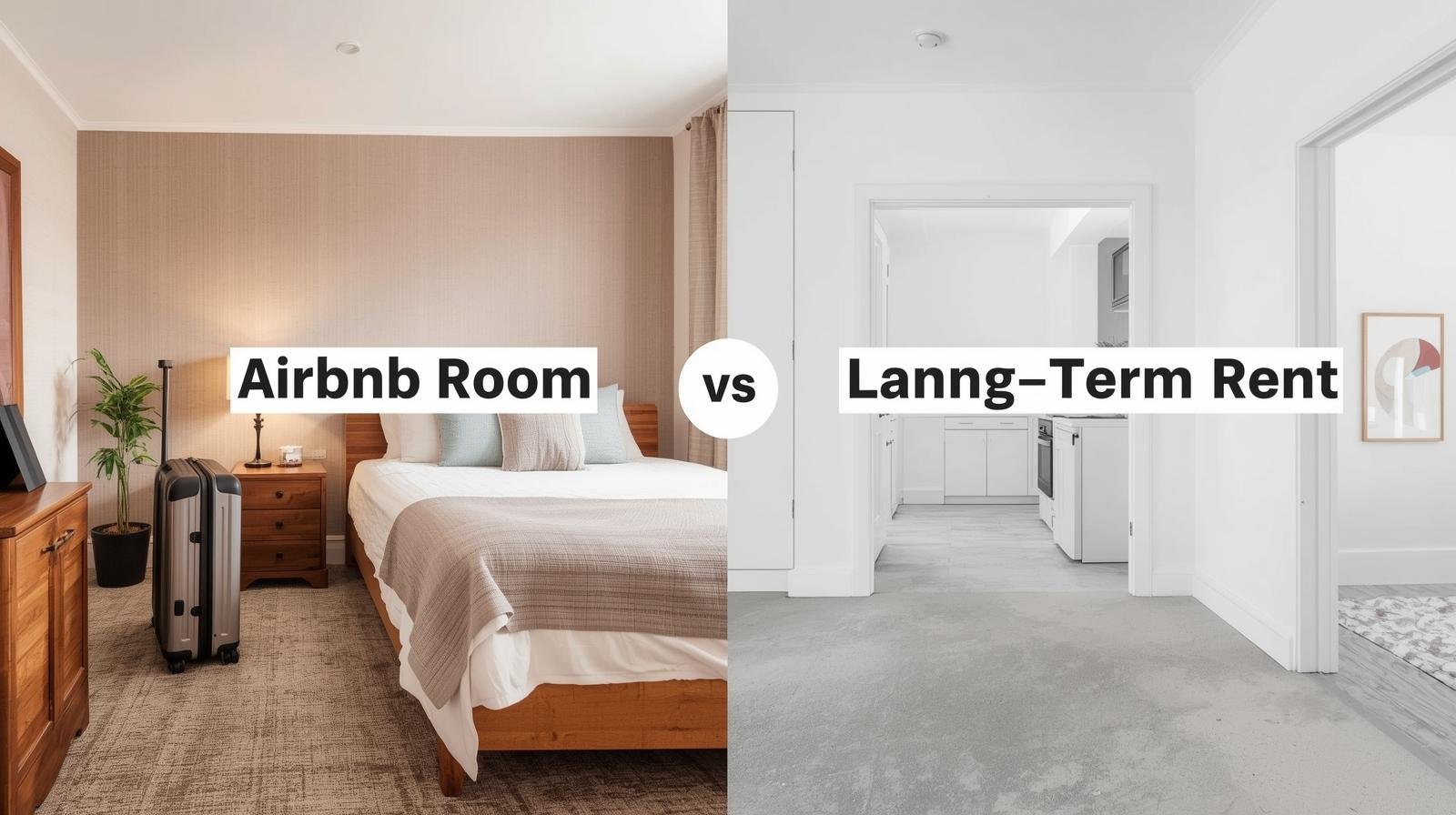If you have your own place, consider whether it is more profitable to list it on Airbnb or rent it out to a tenant. People like both options. Airbnb allows for flexibility and higher nightly rates. Long-term leases offer steady, predictable income.
The real question is—which pays better for you? This guide will go over what you can expect to earn, hidden costs, time commitment, the law, and impacts on lifestyle so that you can have confidence in your decision.
1. The Potential For Income Peaks And Stability
Airbnb (Short-Term Rental).
- In popular areas, higher nightly stays can add up to 2-3 times a standard month’s rent.
- Occupancy spikes due to seasonal events, tourist influxes, and peak weeks.
Long-Term Rental (LTR).
- Stable monthly income makes budgeting simple.
- You know exactly what comes in each month, even in slower markets.
If you rely on Airbnb to fill up your property’s calendar, your rent won’t matter.
2. Costs & Overhead
- Cost of Airbnb: Fees for cleaning, utilities, furniture, restocking, and commissions to the platform. Expect turnover and management expenses to eat into profit.
- Long-Term Costs: lower. The tenant generally pays for utilities and any minor repairs, so there are fewer surprises in your monthly expenses.
Airbnb is like a mini business (you need to manage a lot of moving parts), while long-term rent is set and forget.
3. Time & Effort
- Guest messaging, reviews, key exchanges, and cleaning schedules on Airbnb. Unless you hire a property manager, you’ll be on call.
- Carrying long-term rental properties comes with a very low time commitment once a lease is signed. The only real work is maintenance and renewals.
If you value free time, long-term leasing wins easily.
4. Regulations & Risks
In cities across the globe, Airbnb has been hit with more and more rules. Permit requirements, nightcaps, and extra taxes. Certain towns even limit or outlaw short-term rentals.
Longer leases are covered by existing landlord-tenant law, which makes them safer, predictable, and less susceptible to sudden legal change.
5. Lifestyle Fit
- Pick Airbnb if you like hospitality, live near a market with strong demand, and do not mind doing so.
- Pick Long-Term Rent if you want reliable income, less stress, and lower regulatory risk.
Some landlords, however, do a combination of both—they’ll rent long-term in the off-season and switch to short-term when demand peaks.
6. Quick Comparison Table
| Airbnb | Long-Term Rental | |
|---|---|---|
| Income potential. | High (if often booked) | Moderate but steady |
| Cost. | High (cleaning, utilities, fees) | Low (tenant pays most) |
| Time commitment. | Daily/weekly management is | Minimal once it’s let |
| Regulation. | Getting stricter, Evolving, and predictable | |
| Flexibility. | High-use when you want | Low-locks income |
| Risk level. | Higher (vacant, rules) | Lower (contracts, law) |
Tips, Tricks & Hacks 💡
- If you’re an Airbnb host, you should automate your check-ins using smart locks. Then, use dynamic pricing software, so your nightly rate is always suitable based on demand. Finally, have a local cleaning crew to save time.
- If you are renting long-term, , screen your tenants thoroughly, have a late-fee clause in your tenant agreement,, and increase the rent slightly with each renewal.
- Consider getting into Airbnb with just one room. Long-term rent the rest of the house.
Frequently Asked Questions: Renting Out To Airbnb Versus Long-Term Renting?
Is Airbnb always more profitable?
Not always. High income depends on occupancy and location.
Do long-term tenants pay utilities?
Often, yes, reducing landlord costs.
What if my Airbnb gets bad reviews?
Occupancy can drop quickly—reputation is critical.
Which is safer legally?
Long-term rentals. Regulations are clearer and less volatile.
Can I switch between models?
Indeed, many landlords give seasonal Airbnb a try, but ultimately return to long-term leases.
How much time does Airbnb take weekly?
Anywhere from 5–15 hours, depending on bookings.
Do I need special insurance?
Yes—short-term rentals usually require separate coverage.
What about property wear-and-tear?
Higher turnover with Airbnb accelerates wear.
Can Airbnb income cover a mortgage?
In busy markets, yes—but riskier than a steady lease.
Which works better in the suburbs?
Usually long-term rent unless near attractions.
How does vacancy risk compare?
Airbnb: high risk. If the tenant is reliable, then LTR is low.
Can Airbnb be passive income?
Only with property managers—otherwise, it’s active work.
What’s the biggest hidden cost with Airbnb?
Cleaning + time between guests (lost days).
How often can I raise rent in LTR?
Typically, at lease renewal—once a year.
Which is better for cash flow planning?
Long-term rent—predictable payments.
What about taxes?
Income earned from your Airbnb may require special reporting to the IRS. Read more about the IRS Rental Property guidelines.
Does property size matter?
Yes—larger homes tend to perform better on Airbnb.
Which option fits retirees?
LTR—less work and fewer surprises.
Which option fits digital nomads?
Airbnb—flexible and income-maximizing if managed well.
Final Thoughts 🌟
There’s no universal winner. Airbnb offers higher upside but more work and risk. Long-term renting provides stability and simplicity. Market, property type, and lifestyle goals define what is the right choice for you.
Airbnb can outperform if you’re after maximum profit and you don’t mind being hands-on. If you want something low-maintenance with a regular inflow of money, then choose long-term rent.

